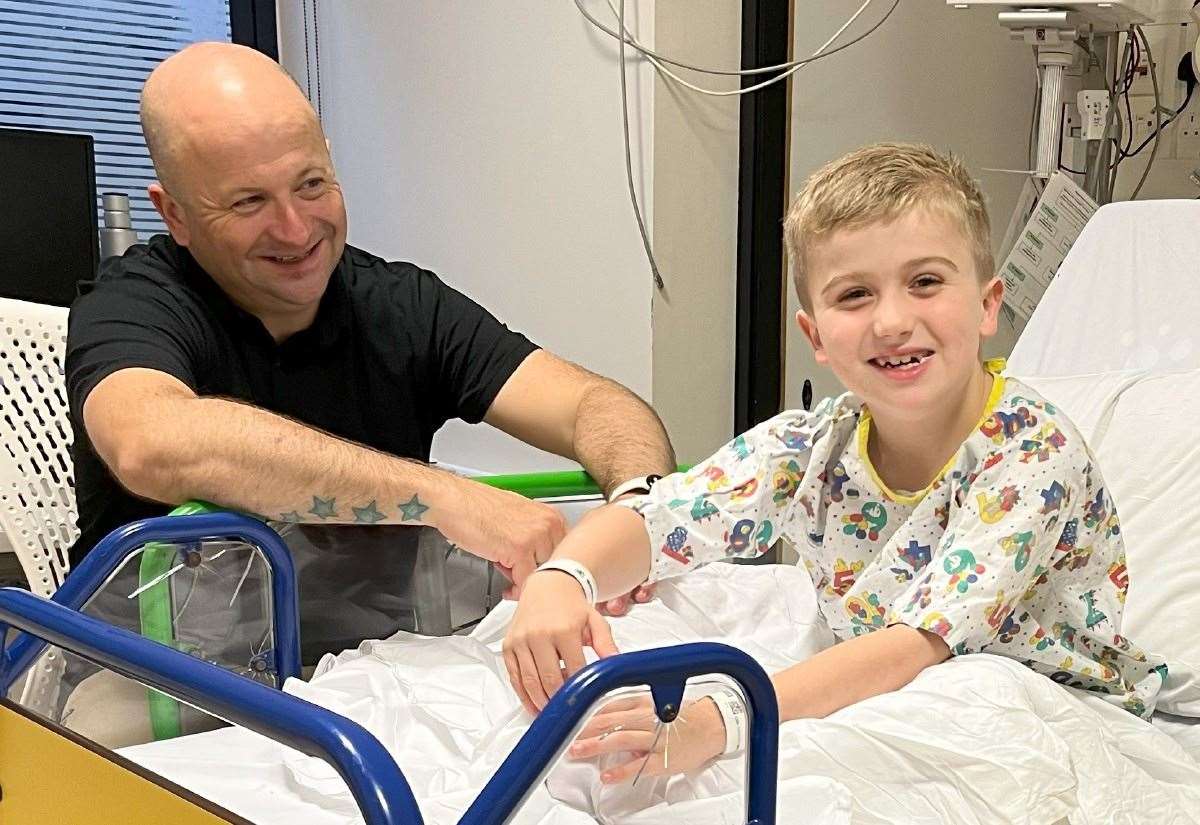When Digby Donnelly was two years old, his mum Lisa noticed something wasn’t quite right.
He waddled when he walked, struggled to lift his neck, and had to roll onto his tummy to sit up.
Digby Donnelly’s symptoms first started showing when he was just two years old
Now nine, Digby has been living with Duchenne muscular dystrophy (DMD) – a rare genetic condition that causes progressive muscle weakness and, heartbreakingly, has no cure.
The diagnosis came after a long and emotional journey for the Donnelly family from Deal.
Lisa explains: “One of my daughters, Matisse, was also experiencing muscle pain, so she had tests and was diagnosed as having the Duchenne gene.
“All the family then had genetic testing and Digby was diagnosed with Duchenne muscular dystrophy.”
The impact on the family has been huge.
“Digby is nine now, but his level of understanding, behaviour and knowledge is like a four-year-old. I had to give up work, and we have had to renovate our house to accommodate his wheelchair and other equipment,” Lisa says.
Digby Donnelly, from Deal, has the muscle-wasting disease Duchenne muscular dystrophy (DMD)
Despite the daily challenges, there is now a glimmer of hope on the horizon – thanks to new research aimed at finding a more effective treatment for DMD.
Charities Action Medical Research and LifeArc are jointly funding a cutting-edge project led by Professor Francesco Muntoni at the UCL Great Ormond Street Institute of Child Health.
It is investigating whether combining existing drugs with genetic therapies could boost the production of dystrophin – a vital protein lacking in children with DMD.
The research will focus on antisense oligonucleotides (AONs) – tiny pieces of genetic material that can override some of the faults in the dystrophin gene, potentially allowing the body to produce a working version of the protein.
“Testing various combinations of AONs with existing medications on patient cells will enable us to determine which is the most effective at increasing dystrophin protein production,” explains Prof Muntoni.
The goal is to fast-track promising new treatment strategies by focusing on drugs already in use or previously trialled.
The impact on Digby’s family has been huge
For families like the Donnellys, the development is hugely significant.
“We know that time with Digby is precious, so we are creating memories for him to help us keep going when the condition gets worse,” Lisa says.
And there have been some truly special moments.
Last Christmas, Digby enjoyed a one-to-one video call with comedian Harry Hill, thanks to the Muscle Help Foundation charity.
He was also treated to a ‘Muscle Dream Day’ – boarding a cruise ship as a VIP guest, meeting the captain, and even sounding the ship’s horn.
“We are grateful to the research teams investigating new ways to treat Duchenne,” Lisa says.
Digby Donnelly’s family say the time they have left with him is ‘precious’ and they want to create ‘memories’
“This new research brings hope to families like ours.”
Each year, about 100 boys in the UK are born with Duchenne muscular dystrophy.
Most are diagnosed in early childhood, and without a cure, life expectancy is often only into their 20s or 30s.
Dr Caroline Johnston, a senior research manager at Action Medical Research, says the charity is committed to funding pioneering studies to give children with rare diseases a better future.
“Previous Action-funded research contributed to the development of AONs as a new class of genetic medicines which restore some function to the faulty dystrophin gene, to help children with DMD,” she says.
“This research will now look at using an additional approved medicine, in combination with AONs developed, to further boost dystrophin levels and develop a new treatment strategy for boys with DMD.”
Dr Karen Skinner, the chief project and portfolio officer at LifeArc, adds: “Duchenne muscular dystrophy is a devastating condition.
“It robs children of their strength, their independence and, ultimately, their future.
“That’s why this research is so important. By building on what is already known and combining cutting-edge science with existing medicines, we hope that this research will fast-track better treatments for children like Digby.”
